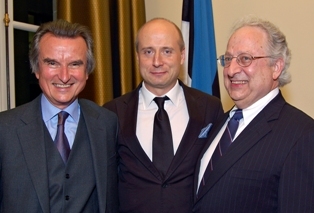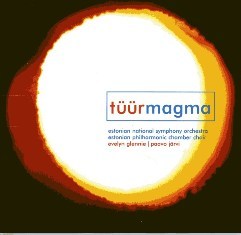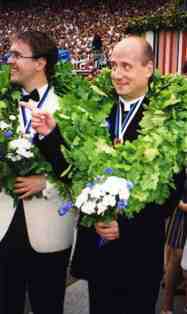Cincinnati Part of Paavo's World
Mary Ellyn Hutton
Posted: Sep 18, 2007 - 12:00:00 AM in
news_2007
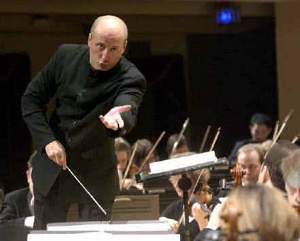
Järvi conducting the CSO at Music Hall in Cincinnati
|
"How natural and nice to come back," Paavo Järvi told a
post-Cincinnati Symphony concert crowd in the Music Hall foyer Saturday
night.
"How much like home it is."
Järvi, 44, opened his seventh season as CSO music director Friday
and Saturday with a festive program of Wagner and Beethoven.
He leads CSO concerts at 11 a.m. Friday, 8 p.m. Saturday at Music
Hall in Bartok's Concerto for Orchestra and Mozart's Flute Concerto No.
2 with flutist Sharon Bezaly.
Järvi, who has literally been around the world since leaving
Cincinnati in early May, is the CSO's first truly international
conductor.
At least since the advent of the jet plane, all previous CSO music
directors have guest conducted outside Cincinnati. Most have had
relationships with other orchestras, but none have had quite as many as
Järvi.
In addition to the CSO, with whom he extended his contract last
spring through August 2011 season, with an "evergreen" clause for
automatic renewals, Järvi is music director of the Frankfurt Radio
Symphony (through 2009 with option to renew), artistic director of the
Deutsche Kammerphilharmonie Bremen (through 2008 with option to renew),
artistic advisor of the Estonian National Symphony (a flexible but
important commitment solidified by his Estonian heritage) and beginning
September, 2010, music director of L'Orchestre de Paris (original term
unspecified, but calling for 14 weeks a year).

Järvi's seven-story image displayed on a department store in Frankfurt
|
"Maybe I can do them all," he said half-seriously, over a quick lunch last week in his Music Hall office
L'Orchestre de Paris general manager George-Francois Hirsch, Järvi and Cincinnati Symphony president Steven Monder at the Salle Pleyel May 30 when Jarvi's appointment as the orchestra's new music director (beginning in 2010) was announced.
Having just returned from opening the season in Frankfurt Sept. 6
and 7 -- shot out of a volcano, as it were, having led the German
premiere of Estonian Erkki-Sven Tüür's aptly titled "Magma" -- he
conceded that "something will have to give." What it will be, however, I'm not clear about yet."
What is clear that is that Järvi has the ability to keep up an astonishing pace.
After closing the CSO season in May, he led three concerts with the
Cleveland Orchestra, helped celebrate his father Neeme Järvi's 70th
birthday with the Estonian National Orchestra in Tallinn and conducted
in Paris, where his new appointment was announced.
He then embarked on a round-the-world tour with the Deutsche
Kammerphilharmonie, which put him in Tokyo just in time for the July 16
earthquake. Then on to Montreal's Ladauniere Festival for a three-day marathon conducting all nine Beethoven symphonies, to the Ravinia Festival in
Chicago and New York for the Mostly Mozart Festival.
He toured with the Frankfurt Radio Orchestra in August, including the orchestra's debut at the London Proms.
Two new Järvi CDs were released, Beethoven's Fourth and Seventh
Symphonies with the DK (second in their cycle of the complete Beethoven
symphonies for BMG/RCA)
and an all-Tüür disc with the Estonian NationalOrchestra (Virgin Classics).
The latter, which includes "Magma," a symphony with percussion
featuring renowned percussionist Evelyn Glennie, was just named a
record of the month by both Gramophone and BBC Music magazines (An
all-Sibelius CD with the orchestra and choirs of his native country won
a Grammy in 2004, a first for Estonia.)
His latest CSO CD, Tchaikovsky's Symphony No. 6 ("Pathetique") and
"Romeo and Juliet," will be released by Telarc Oct. 23. Järvi conducts
14 weeks in Cincinnati this season and will take the orchestra on a
tour of Europe in April.
It is a measure of Järvi's total immersion on the podium that he did
not notice the earthquake in Japan, at least the first one, which happened
during a DK rehearsal in Tokyo. "I saw my orchestra looking up and I
looked back and saw the chandeliers going, but I was so involved that I
actually missed the earthquake (6.8 on the Richter Scale and centered in
Niigata Prefecture northwest of Tokyo).
He did feel the second one, which took place during the concert
that evening, he said. "You immediately think that there's something
wrong with you because you have this feeling that somehow you're not
standing securely. Then you realize it actually might be an
earthquake" (the performance did not stop, however).
The Montreal marathon was "a lot of fun, but completely
exhausting," partly due to the 13-hour jet lag (time lost) coming from
Japan.
Having several orchestras can have a "cumulative effect," said
Järvi. While in Montreal, the management of the Ladauniere festival
approached him about bringing the Cincinnati Symphony to the festival.
"If we do a summer tour, it could fit in, which would be great."
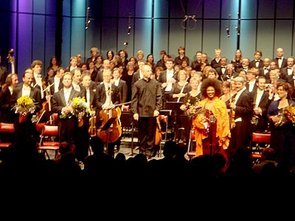
Jarvi and the Deutsche Kammerphilharmonie at the Lanaudiere Festival in July, 2007
|
Järvi is never really away from the CSO, he said. "When I'm on the
road, I'm in touch all the time with Cincinnati. You can't just
organize something and then come back a month later without having
contact with home base. We're constantly on the phone. And when I'm
here, I'm completely here."
When Järvi is on the podium, he is completely there, too, which
explains why, unlike some conductors, he does not address audiences
from the stage.
"You have to get to the point where you are ready to perform a
90-minute symphony. I am not able to turn around and say, 'by the way,
there's a funny story about Mahler.' If people want show business,
there are other options. The intense concentration that goes on beforehand should be very clear to the audience. They surely don't think you just walk off the street and kind of do the thing."
("Paavo's Notes," taped remarks projected onto a screen above the
stage before the concert, have been implemented this season to help
lessen the formality between Järvi and the audience.)
Järvi explained how he prepares for concerts. "I come here (to
Music Hall) as late as possible, the later the better. I sleep before
the concert. I try not to talk to people. I'm trying to get into this
world. It's not a particular routine. I just need to be alone,
because then everything starts getting into place.
"Sometimes I can't sleep before the concert, but if I am in bed and
I am completely naked under the covers, somehow I feel very calm. I
can concentrate. I am thinking about nothing in particular, but
everything is sort of coming together. Then I feel energized, like I
am ready for the evening. Otherwise, I am scattered. My brain doesn't
have a moment to cool down."
Since he became music director in 2001, Järvi's commitment to
Cincinnati has grown, he said, especially in the extra-musical area.
"I recognize that the orchestra is in a situation where we are gearing
up for a major (capital fund-raising) campaign. I don't have any
problem with being part of that activity.
"I don't do any fund-raising in Europe (where governments support
the arts). A person taking a job in America has to understand that
this is part of the job. On the other hand, the people who are running
these orchestras have to understand that if it starts taking away from
the time that goes into artistic issues, then you are working against
yourself. There is always a balance."
Unfortunately, the CSO's most pressing need right now is money.
"The loss we took in this recent stock market (decline) needs to be
made up. It was a real blow."
(The CSO endowment fell from over $90 million to the mid-60s before recovering to $74 million today.)
"People in Cincinnati have to understand that they don't have to
support Paavo Järvi. They need to support the Cincinnati Symphony.
Artistically, we are better now than we were ever before. It's a
question of the major institution in this community that people need to
support and realize the importance of supporting. The support is
there, actually. It just needs to be made up."
The CSO, long an industry leader in the earned income area -- including
ticket sales, revenue from the summer facility Riverbend (which the CSO owns) and events such as the "Tall Stacks" riverboat festival -- has put enhanced priority on donations and trying to cultivate so-called "super donors."
"We are talking about gifts in the $50 million range, like an
Annenberg gift in Philadelphia," Järvi said. (The Philadelphia
Orchestra launched its $125 million endowment campaign in 2003 with $50
million from the Annenberg Foundation).
"We have to be able to financially get to the point where we are
able to worry less about box office. In light of the fact that we have
a very large hall (3,516 seats, largest concert hall in the U.S.) we
are worried about box office too much."
One of Järvi's "big disappointments," he said, has been lack of
understanding by the "larger Cincinnati audience" of the need to
downsize Music Hall.
"I understand their emotional response, but they
don't understand the issue. Nobody wants to demolish it or build
something else. There are things that need to be done in this hall. I
read sometimes the reactions of people, and I realize they basically
don't understand. They think we're trying to take the easy way out
because we can't sell tickets. We are trying to preserve the hall, but
make it relevant."
Järvi is excited about Cincinnati's new School for Creative and Performing
Arts under construction at Elm and Central Parkway and what it means
for revitalizing Over-the-Rhine. Cincinnati owes itself to show that
they are able to transform this neighborhood. It's a matter of pride
and commitment and also of good business. If this area truly develops
the way it should and the way we are all hoping, it will mean
tremendous business for the city."
Despite his numerous commitments, Järvi, a resident of
East Walnut Hills, is in Cincinnati "much more in comparison to my
other orchestras," he said. "My family lives here (wife Tatiana and
daughters Lea, 3, and Ingrid, whose first birthday is Wednesday). Lea
goes to Montessori School here. Cincinnati is very much the center for
us in our life.
"Even if I would have only one orchestra -- and it would be
Cincinnati -- we would still travel for guest conducting. We would
travel just because of being Estonian and wanting to go back to Estonia
and spend some time so my kids can actually get to know it. I want them to speak Estonian."
Järvi jokes with onlookers at 2004 Estonian National Song Festival in Tallinn (Estonian conductor Olar Elts on the left)
Some of Järvi's very best friends are in Cincinnati, he said. "Most
of them are on the (CSO) board. I have people who I really feel close
to who have been extremely kind and not only in terms of the necessary
business relationship.
"I'm very open, you know. If you go to Hyde Park Kroger at twelve
o'clock at night you could run into me. It's the perfect time to shop because there is nobody there."



